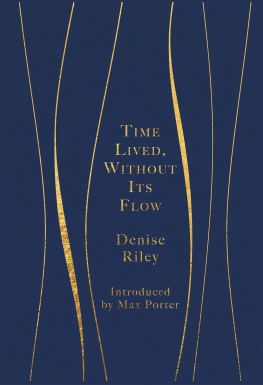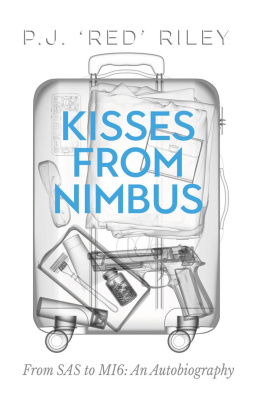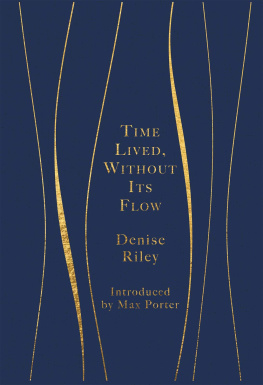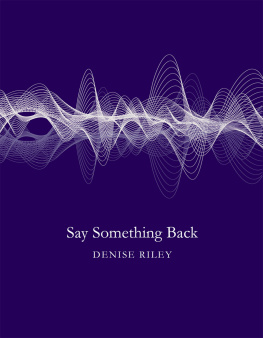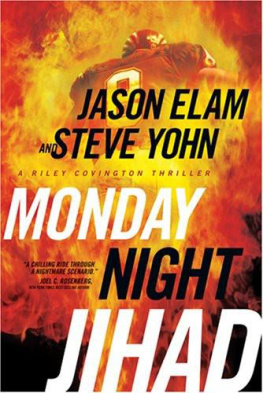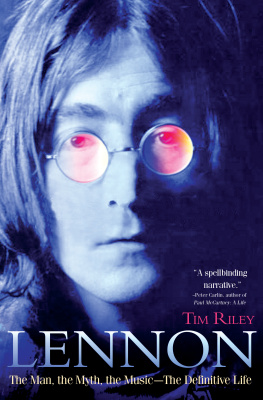Time Lived, Without Its Flow
DENISE RILEY

CONTENTS
In loving memory of Jake
Also by Denise Riley
POETRY
Marxism for Infants
No Fee, with Wendy Mulford
Dry Air
Stair Spirit
Mop Mop Georgette
Selected Poems
Say Something Back
PROSE
War in the Nursery: Theories of the Child and Mother
Am I That Name?: Feminism and the Category of Women in History
The Words of Selves: Identification, Solidarity, Irony
Impersonal Passion: Language as Affect
About the Author
Denise Riley is a critically acclaimed writer of both philosophy and poetry. She is currently Professor of the History of Ideas and of Poetry at UEA. Her visiting positions have included A. D. White Professor at Cornell University in the US, Writer in Residence at the Tate Gallery in London, and Visiting Fellow at Birkbeck College in the University of London. She has taught philosophy, art history, poetics, and creative writing. She is the author of Say Something Back and lives in London.
Time Lived, Without Its Flow
Ill not be writing about death, but about an altered condition of life. The experience that not only preoccupied but occupied me was of living in suddenly arrested time: that acute sensation of being cut off from any temporal flow that can grip you after the sudden death of your child. And a child, it seems, of any age.
Because Im considering a state thats not rare, but for many is lived daily, I shant be having recourse to an exceptionalist diction of trauma. And whether this state might be considered to fall within the compass of pathology doesnt greatly bother me here, although my inclinations to avoid that judgement. Certainly someone could produce an account of this freezing of time as an act of dissociation, or a borderline psychotic effort to erect a shield against the deaths reality. Or someone else could produce neurological accounts of the brain flooded with its own this time, biochemical defences. But I want to avoid offering my amateur speculations about existing theories. Instead, while hoping not to lapse into melodrama or self-regarding memoir, Ill try to convey that extraordinary feeling of a-temporality.
But how could such a striking condition ever be voiced? It runs wildly counter to everything that Id thought we could safely assume about lived time. So this arrested time is also a question about what is describable; about the linguistic limits of what can be conveyed. Im not keen on conceding to any such limits. Yet it seems that the possibilities for describing, and the kinds of temporality that you inhabit, may be intimately allied. For there do turn out to be kinds, in the plural.
This stopping of time can, for those who find themselves plunged into it, be lived. It turns out, surprisingly, not to be necessary to live only inside a time that runs in a standard movement. You discover, on the contrary, that you can manage well enough inside your private non-time of pure stasis. That such an experience is not uncommon, Im sure, as Ive listened closely for several years to what bereaved parents say in meetings, in online discussions, or in private encounters and this in two countries. Yet any published mention of this seemingly a-temporal life is rare. Before speculating about its absence, I want to insist that such a prolonged cessation of the flow of time is not contained by the well-worn metaphorical remark that time stopped. Theres nothing that feels either familiar or metaphorical in living out this condition in which time, perhaps for years on end, is arrested. The weak metaphor of time stopped would sap the force from a description of this new state. Once youre plunged into it, the actual metaphoricity of our usual accounts of the passage of time is laid bare, for now you realize that the real espousal of figurative speech would be to maintain that time inevitably flows.
Hard to put into words, yet absolutely lucid as you inhabit it daily, this sensation of having been lifted clean out of habitual time only becomes a trial if you attempt to make it intelligible to others whove not experienced it. The prospect of recounting it in a written form stayed, for me, both repugnant and implausible for well over two and a half years after the death. You cant, it seems, take the slightest interest in the activity of writing unless you possess some feeling of futurity. The act of describing would involve some notion of the passage of time. Narrating would imply at least a hint of and then and after that. Any written or spoken sentence would naturally lean forward towards its development and conclusion, unlike my own paralysed time. Why should you even dream of explaining how, after an unexpected death, you might find yourself living in this profoundly altered temporal state? The risks of trying are clear enough: youd resemble the survivor of the 1960s who bores everyone with tales of his inexpressibly memorable acid trips then, as if worse were needed, youd top it off with the layer of unassailable pathos due to your status as the mother of a dead child.
Nonetheless, however commonplace this condition of being outside time, when youre first in it, its so quietly astonishing that you cant do other than take a cool interest in how you might characterize it. This, for several reasons. Because to concede at the outset that its indescribable would only isolate you further, when coming so close to your childs death is already quite solitary enough; because its scarcely rare, for immeasurably vast numbers have known, and will continue to know, this sense of being removed from time, and so your efforts might well be familiar to everyone else whos also struggled to speak about this vivid state. Or perhaps its also a kind of vanity, my hope that describing it might ring true for others who are in the same boat.
Theres no specific noun for a parent of a dead child; nothing like the terms for other losses such as orphan or widower. No single word exists, either, for an adult child an awkward phrase which could suggest a large floppy-limbed doll. For such a historically common condition as outliving your own child, the vocabulary is curiously thin. The same phrases recur. For instance, many kindly onlookers will instinctively make use of this formula: I cant imagine what you are feeling. Theres a paradox in this remark, for its an expression of sympathy, yet in the same breath its a disavowal of the possibility of empathy. Undoubtedly its very well meant, if (understandably) fear-filled. Peoples intentions are good; a respect for the severity of what they suppose youre enduring, and so a wish not to claim to grasp it. Still, Id like them to try to imagine; its not so difficult. Even if its inevitable, or at any rate unsurprising, that those with dead children are regarded with concealed horror, they dont need to be further shepherded into the inhuman remote realms of the unimaginable. So I want to try, however much against the odds, to convey only the one striking aspect: this curious sense of being pulled right outside of time, as if beached in a clear light.
My own instincts here happen to run in favour of de-dramatizing; but to properly de-dramatize, first youd need to admit this strangeness fully into the compass of the discussable. Perhaps there may be at least a half-tellable ordinariness here. This demands witness. Ill offer some of that, if hesitantly, as Id rather have steered clear of all autobiography. A few of my notes are reproduced below, though they can walk around only the rim of this experience. At times they loop back on themselves, for one effect of living inside such a temporal suspension is that your reflections will crop up all over again but as if, on each occasion, theyre newly thought.

